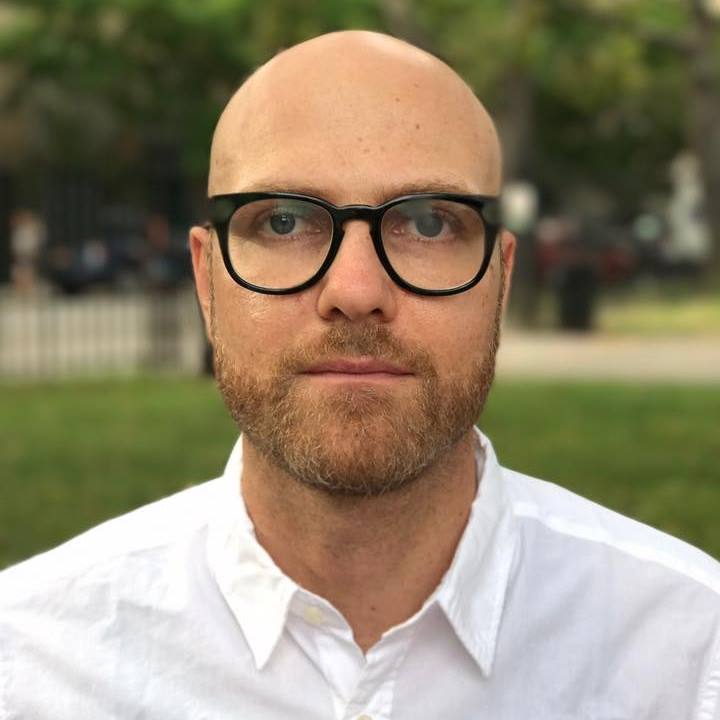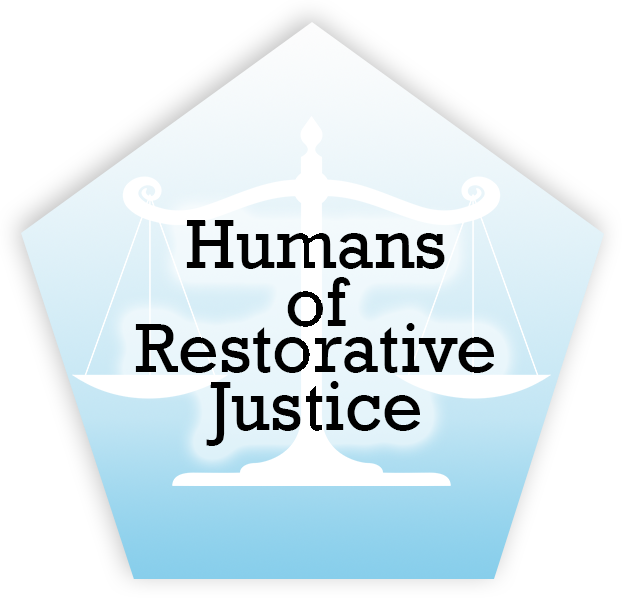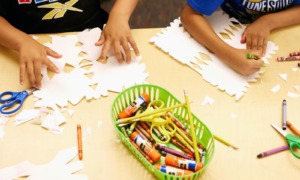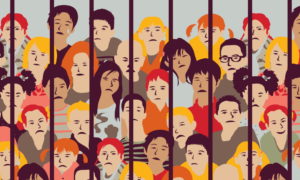
Phovoir/Shutterstock
.
Humans of Restorative Justice (HORJ) stories highlight the incredible individuals working to build and restore strong relationships in their communities. They are written and edited by David Levine based on interviews with real-world practitioners. This one is with Anderson of Detroit.
A referral came in from a music teacher in our high school. The music department was preparing for the Winter Showcase and apparently someone had broken a bunch of plastic prop icicles during a rehearsal. A few students had reported seeing Isaiah (names have been changed) playing with them earlier in the day, so the teacher, Randy, wanted to get to the bottom of it.
In my interview with Isaiah, he admitted to playing with them but vehemently denied that he broke them afterwards. He also claimed that Randy had yelled at him for it in front of the other students and that really upset him. They both had agreed to meet and discuss in a mediation.

David Levine
The mediation went well. We did not solve the icicle mystery, unfortunately, but Isiah apologized for being in an area that he should not have been and offered to help clean up the floor after school. Randy had explained the stress he was under with the showcase and admitted he could have handled himself more calmly in that moment. We even had time to discuss some of the reasons behind Isaiah’s currently failing grade and what he would need to do to bring it up to passing. Hands were shaken.
Before leaving, Randy asked me, “Do you want to speak to the other music teacher who was also there at the rehearsal? I can go cover for him and send him up.” Though I had not planned on this, wanting to make sure everyone affected was involved in the restorative process I said, “Sure, thank you, send him up.”
I debriefed with Isiah as we waited for the other teacher, Phillip, to join us. At the time, I did not know that Philip would not want to take part in this mediation. As I was new to the school that year, I was not aware that Philip was actually quite vocal in his skepticism of the new restorative direction that the school was taking toward discipline.
‘You’re lying’
I could sense Philip’s tension the moment he walked in and sat down at the table. Not long after I started to go over some basic protocols of our discussion, things went south. Philip made his stance clear by saying something like, “No disrespect, but I think we are wasting our time here. Several kids say they saw Isaiah playing with the icicles, so I’m not trying to hear his excuses. In fact he barely shows up to class and that’s why he is failing. That’s what we should really talk about.”
 I attempted to regain focus. “Philip, those are valid concerns and we can get to them one by one, but I want to make sure that you both have a chance to speak and be heard before we …” Isaiah jumped in, “I didn’t break the icicles, I saw Sandy and Mike playing with them too, why don’t you …” “You’re lying,” Philip fired back. “I know you are lying and it’s ridiculous that I’m missing class for this.”
I attempted to regain focus. “Philip, those are valid concerns and we can get to them one by one, but I want to make sure that you both have a chance to speak and be heard before we …” Isaiah jumped in, “I didn’t break the icicles, I saw Sandy and Mike playing with them too, why don’t you …” “You’re lying,” Philip fired back. “I know you are lying and it’s ridiculous that I’m missing class for this.”
I could see that this was not working and I said so to Isaiah and Philip. “I don’t want to use this time to argue, and I hear that Philip is concerned about missing his class, so let’s pause on this process for now. I can meet with you both individually and see how we can move forward from this in a more productive way.” “So I can leave?” Philip asked in irritation. “Yes,” I said.
Frankly, I was shocked by how Philip acted towards Isaiah, and how he had disrespected the mediation. I tried to hide this from Isaiah but I’m sure he could see it. I simply apologized to him that it didn’t go as well as I expected and that we need to all be better than this in the mediation setting, but that it is normal for emotions to run hot at times. After we were done, I walked back to the restorative justice office feeling angry at Philip for not showing more restraint and respect as the adult and educator. I sat down at my computer to take down some notes from the event and to clear my head.
I shared the RJ office with another dean and an assistant principal. The three of us were gung-ho about bringing RJ to the school and had become quite close: We shared a friendly and informal relationship where we spoke our true feelings and joked around a lot. We also shared a Google Doc where we would take notes on RJ events so that we could all stay on the same page.
My mistake
The other dean was out sick on this day so I wanted to let her know what went down. I usually stuck to brief facts on this doc but I was upset as I described Philip’s behavior. Somewhere in my notes I wrote that he was being a “colossal dick.” That afternoon, there were a million other things happening around the school and I forgot all about the event.
What I didn’t know was that to increase transparency and help promote the RJ work we were doing, the assistant principal had recently changed the Google Doc settings from a private doc that the three of us shared to one that was accessible to any and all of the staff. Yup. Sure enough, a few days later, someone on staff looked at the doc and told Philip what I had written about him.
I was horrified when this was reported to me by Anea, a history teacher, who also let me know that Philip had threatened to make an official complaint against me to the school district. I was mortified, embarrassed, ashamed and even though I stood behind my feelings toward Philip’s behavior and had not intentionally made the mistake, I genuinely felt sorry for what harm I had caused.
Luckily, Anea was also trained in RJ and mediation and had gotten Philip to agree to let her mediate a meeting between the two of us the next day. I was appreciative that the school really stood behind this RJ work, even supporting its use with us staff. There are a lot of schools that ask students to engage in this process but stick to traditional ways of dealing with conflict among staff members.
I felt sick about my upcoming mediation and was convinced that many staff at the school were talking about what had happened behind my back as I walked down the halls. Not the way I wanted to help spread a positive message of RJ across campus. It was all I could think about until we sat down the next day.
The meeting was pretty straightforward. I quickly made a genuine apology for what had happened and assured Philip that he had every right to be upset at me. It was true that I disapproved of his behavior with Isaiah, and I let him know that I didn’t think he should have said what he did but said that I truly had acted unprofessionally in my notes and I felt horrible. Even if they were just seen by three people, it was wrong to write that language on a school document.
Anxious and ashamed
He told me that he had every right to file an official complaint and wanted me to know that, which I acknowledged. Anea did a good job of keeping us on track and unpacking the situation. As in most mediations, I benefited from learning more about his perspective. For instance, when Randy had asked me, “Do you want me to send up the other teacher that was here, I can cover for him,” it seemed like an easy “yes.” But Randy had in fact simply walked up to Philip and said, “You need to go upstairs for a mediation about what happened with Isaiah.”
Philip felt disrespected by this, by the assumption that he should just drop whatever he was doing and go talk to Isaiah, a student he really didn’t feel deserved this precious time at the end of the semester after barely attending his class. I explained that I had no idea the mediation was presented that way to him, that it is always voluntary and that I could see how that put him in a foul mindset towards the process. I really should have made sure to consult with him before I brought him into that space. That was my fault. He accepted my apology, agreed not to file a grievance, asked not to be a part of any further mediations and we left the room. I learned from Anea that he is actually a wonderful teacher who uses a lot of restorative practices in his classes, but that he was skeptical of a lot of changes that were happening this year.
Despite this being my third year using restorative practices in schools, I had never been on this side of the mediation table before. It was eye-opening. I got to see and feel what so many students experience when we ask them to engage in this work. I was anxious about the mediation. I felt ashamed and embarrassed of my actions. I was scared that I might be formally punished. I wondered who was talking about me and my mistake as I walked the hallways of the school.
As sorry as I was for the whole event, it gave me a lot of empathy and compassion for the students I work with. And to think that students face all this and the repercussion of a call home to family. At least I didn’t have to worry that the school was calling my mom! I had gained a new respect for the courage and maturity youth must show in facing those they have harmed or those who have harmed them. It helped me to reflect on and refine my mediation skills.
I’d love to say that Philip and I became fast friends after this. Though that didn’t happen, our mediation gave me a greater understanding of what he was thinking and feeling as a teacher in the school. The next year, I wrote him an email telling him that I respected his work in the music room and that I hoped we could start fresh working together. He politely responded that he would rather simply keep our interactions minimal where possible.
And though that was not encouraging, we ended up working together in the same space later that year and actually had some really great discussions and debates about student discipline. It turned out that, philosophically, we really were not that different. I truly believe that without the mediation we had the year prior, without the apology and the listening that occurred, we would not have felt comfortable to have those conversations and to work so well together to the benefit of the students we both served.
It is so easy to forget how it feels for others sitting at a mediation table or in a circle. This unfortunate experience resulted in not only a change of my behavior, but also allowed for my growth as a person and a community member; put simply, RJ at its best.
David Levine has worked as an educator at public high schools in Brooklyn and Seattle, and as a restorative justice dean in the Bronx. He is currently a course facilitator at the National Center for Restorative Justice, an organization that provides training for those looking to change their relationship to conflict. Contact him at d.levine@nationalcenterforrestorativejustice.com.































